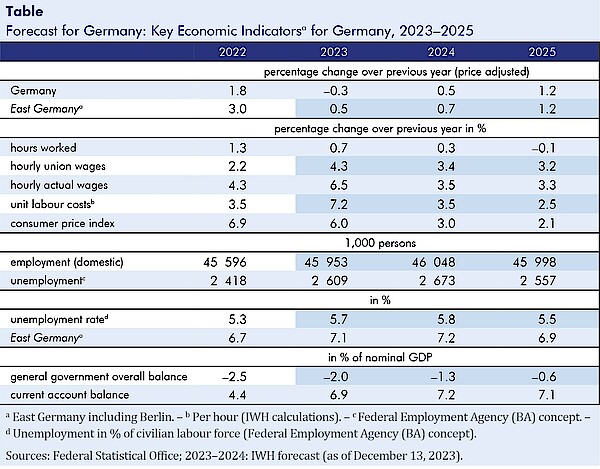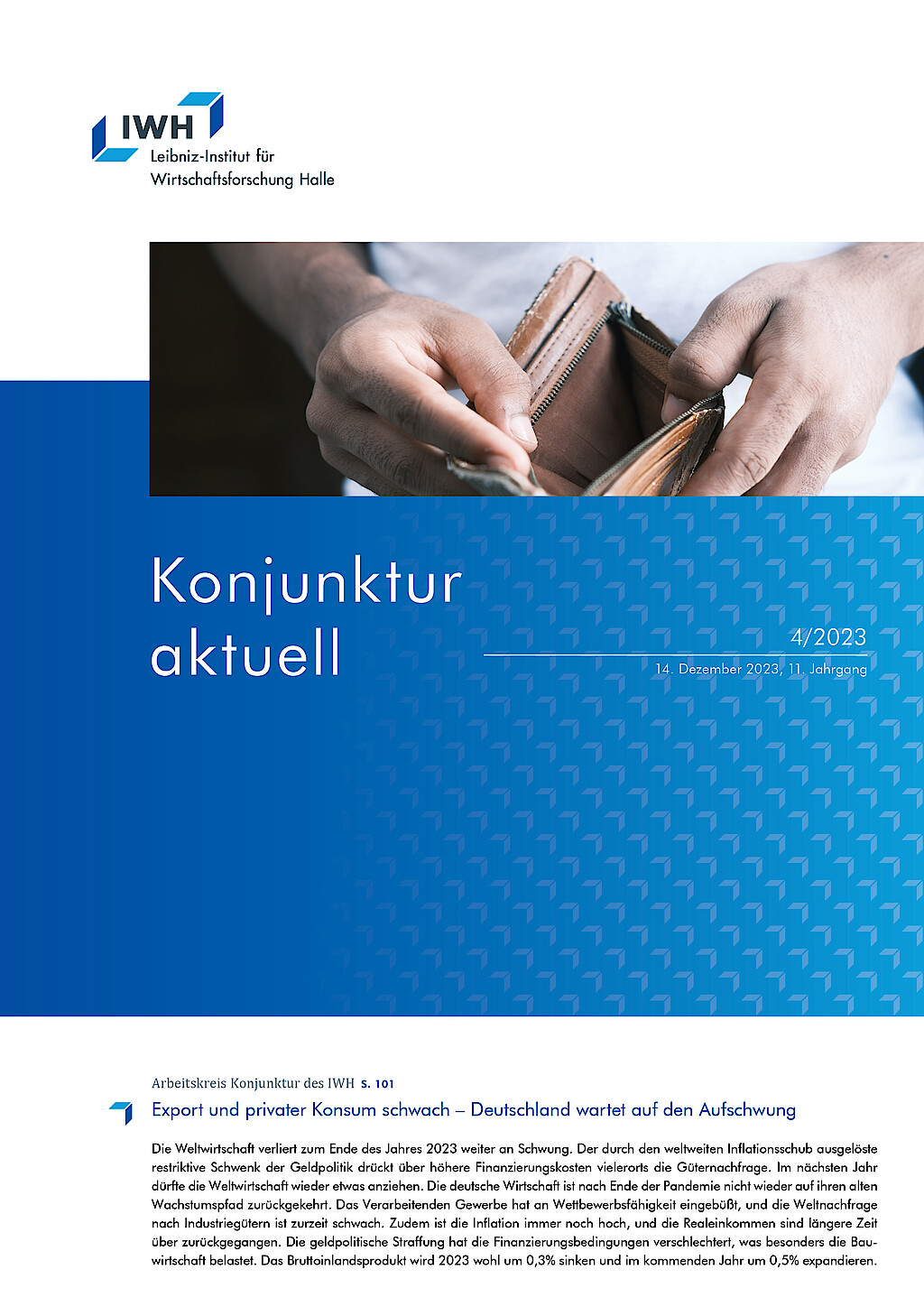Exports and private consumption weak ‒ Germany is waiting for an economic upturn

The global economy continues to lose momentum towards the end of 2023. The phase of recovery from the pandemic is largely complete, and the restrictive monetary policy shift triggered by the global surge in inflation is depressing demand for goods in many places due to higher financing costs. The European and the Chinese economy are facing special burdens: In Europe, these are the Russian war against Ukraine and the high energy costs related to it. In China, it is the structural crisis in the property sector, which is of particular importance in this country. However, there are also reasons to expect the global economy to pick up again somewhat in the coming year. In particular, the recently steep decline in inflation rates in the US and the euro area has increased the likelihood that monetary policy will be loosened somewhat in the course of 2024.
The German economy has not returned to its previous growth path since the end of the pandemic. In real terms, gross domestic product is barely higher than before the outbreak of the pandemic; this is 4% below the level expected for 2023 in the IWH's medium-term projection from December 2019. There are several reasons for this: Important areas of the manufacturing industry have lost competitiveness, particularly the automotive industry in the wake of the shift from combustion engines to electric motors and the chemical industry due to higher energy prices in Europe. In addition, global demand for industrial goods is currently weak. Moreover, inflation in Germany is still high, and real incomes have been falling for some time. The tightening of monetary policy has worsened the previously very favorable financing conditions, which is having a particularly negative impact on the construction industry. In addition, the economy has to prepare for new burdens because of the Federal Constitutional Court’s ruling on the second supplementary budget 2021 in November. “There are no signs of an improvement in the economy over the winter,” says Oliver Holtemöller, head of the Macroeconomics Department and vice president at the IWH. “Over the course of 2024, however, rising real wages will support consumption, and the German export industry should benefit from international demand for manufacturing gradually picking up.”
A particular risk for this forecast is that details of the government’s reaction to the ruling of the Federal Constitutional Court are still unknown. “Funding once promised for a large number of investment projects might be cancelled or significantly reduced,” says Holtemöller. In addition, confidence in the carbon-neutral renewal of the economy could be lost, since the path propagated by policy up to now has primarily involved state subsidies for green investments. “Even in the short term, such a loss of confidence could have a negative impact on the willingness to consume and invest in Germany,” the economist says.
The extended version of the forecast contains two boxes (both in German):
Box 1: On the effects of the Constitutional Court ruling of
15 November 2023
Box 2: On the estimation of potential output
Publication:
Drygalla, Andrej; Exß, Franziska; Heinisch, Katja; Holtemöller, Oliver; Kämpfe, Martina; Kozyrev, Boris; Lindner, Axel; Mukherjee, Sukanya; Sardone, Alessandro; Schult, Christoph; Schultz, Birgit; Zeddies, Götz: Konjunktur aktuell: Exports and private consumption weak ‒ Germany is waiting for an economic upturn. IWH, Konjunktur aktuell, Jg. 11 (4), 2023. Halle (Saale) 2023.
Whom to contact
For Researchers

Vice President Department Head
If you have any further questions please contact me.
+49 345 7753-800 Request per E-MailFor Journalists

Internal and External Communications
If you have any further questions please contact me.
+49 345 7753-832 Request per E-MailIWH list of experts
The IWH list of experts provides an overview of IWH research topics and the researchers and scientists in these areas. The relevant experts for the topics listed there can be reached for questions as usual through the IWH Press Office.
Related Publications

Konjunktur aktuell: Export und privater Konsum schwach – Deutschland wartet auf den Aufschwung
in: Konjunktur aktuell, 4, 2023
Abstract
Die Weltwirtschaft verliert zum Ende des Jahres 2023 weiter an Schwung. Der durch den weltweiten Inflationsschub ausgelöste restriktive Schwenk der Geldpolitik drückt über höhere Finanzierungskosten vielerorts die Güternachfrage. Im nächsten Jahr dürfte die Weltwirtschaft wieder etwas anziehen. Die deutsche Wirtschaft ist nach Ende der Pandemie nicht wieder auf ihren alten Wachstumspfad zurückgekehrt. Das Verarbeitenden Gewerbe hat an Wettbewerbsfähigkeit eingebüßt, und die Weltnachfrage nach Industriegütern ist zurzeit schwach. Zudem ist die Inflation immer noch hoch, und die Realeinkommen sind längere Zeit über zurückgegangen. Die geldpolitische Straffung hat die Finanzierungsbedingungen verschlechtert, was besonders die Bauwirtschaft belastet. Das Bruttoinlandsprodukt wird 2023 wohl um 0,3% sinken und im kommenden Jahr um 0,5% expandieren.



